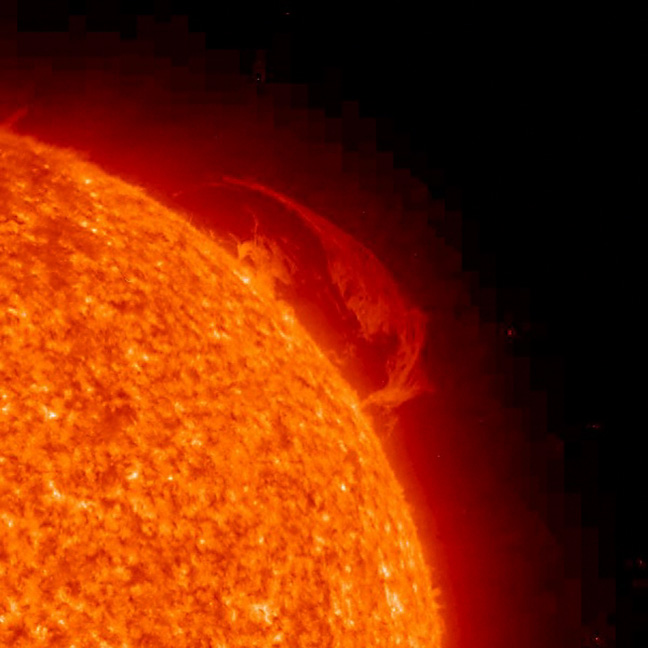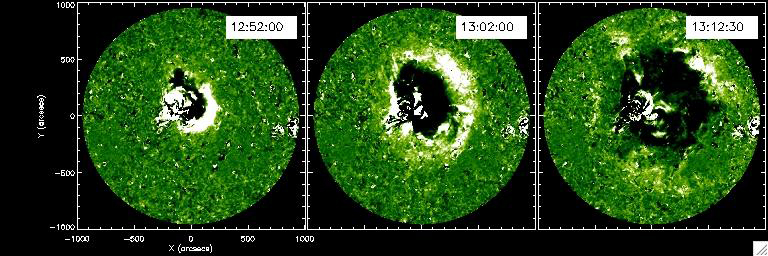New Mars Forums
You are not logged in.
- Topics: Active | Unanswered
Announcement
Pages: 1
#1 2007-04-23 11:44:46
- cIclops
- Member
- Registered: 2005-06-16
- Posts: 3,230
Re: STEREO - 3D solar imaging

Check out the large version of this image with 3D glasses
NASA's Solar TErrestrial RElations Observatory (STEREO) satellites have provided the first three-dimensional images of the sun. For the first time, scientists will be able to see structures in the sun's atmosphere in three dimensions. The new view will greatly aid scientists' ability to understand solar physics and there by improve space weather forecasting.
[color=darkred]Let's go to Mars and far beyond - triple NASA's budget ![/color] [url=irc://freenode#space] #space channel !! [/url] [url=http://www.youtube.com/user/c1cl0ps] - videos !!![/url]
Offline
Like button can go here
#2 2007-10-02 01:32:46
- cIclops
- Member
- Registered: 2005-06-16
- Posts: 3,230
Re: STEREO - 3D solar imaging

Smooth Streaming - September 22-23, 2007 - video 0:18 mins
One of the STEREO spacecraft (Behind) observed an elongated loop that emerges and then disperses over a two-day period (September 22-23, 2007). This immense structure is generated by magnetic forces rooted inside the Sun. Observed in the 304 Angstrom wavelength of extreme ultraviolet light, it rises up, takes shape, hovers, then gradually and gracefully breaks away from the magnetic forces that held it in place. Its complex twisting and writhing show the complexities of the Sun's magnetic field and are exciting clues for scientists trying to understand and predict solar activity. At its greatest extension it reached about 250,000 miles (400,000 Km) across, roughly the distance from Earth to the moon.
[color=darkred]Let's go to Mars and far beyond - triple NASA's budget ![/color] [url=irc://freenode#space] #space channel !! [/url] [url=http://www.youtube.com/user/c1cl0ps] - videos !!![/url]
Offline
Like button can go here
#3 2008-01-03 05:09:30
- cIclops
- Member
- Registered: 2005-06-16
- Posts: 3,230
Re: STEREO - 3D solar imaging

Movie of Lunar eclipse seen from STEREO-B satellite - 25 Feb 2007
On Feb. 25, 2007, NASA scientists were calibrating some cameras aboard the STEREO-B spacecraft and they pointed the instruments at the sun.
"What an extraordinary view," says Lika Guhathakurta, STEREO Program Scientist at NASA headquarters. The fantastically-colored star is our own sun as STEREO sees it in four wavelengths of extreme ultraviolet light. The black disk is the Moon. "We caught a lunar transit of the sun," she explains.
[color=darkred]Let's go to Mars and far beyond - triple NASA's budget ![/color] [url=irc://freenode#space] #space channel !! [/url] [url=http://www.youtube.com/user/c1cl0ps] - videos !!![/url]
Offline
Like button can go here
#4 2008-05-03 07:28:35
- cIclops
- Member
- Registered: 2005-06-16
- Posts: 3,230
Re: STEREO - 3D solar imaging

Solar Tsunami - 7 Apr 2008
Sequences of STEREO satellite images of a solar tsunami blasting across the Sun's million degree atmosphere. Solar tsunamis are launched by huge explosions near the Sun's atmosphere, called coronal mass ejections (CMEs). These waves can travel at over a million kilometers per hour. The tsunami took place on 19th May 2007 and lasted for about 35 minutes, reaching peak speeds around 20 minutes after the initial blast.
[color=darkred]Let's go to Mars and far beyond - triple NASA's budget ![/color] [url=irc://freenode#space] #space channel !! [/url] [url=http://www.youtube.com/user/c1cl0ps] - videos !!![/url]
Offline
Like button can go here
#5 2008-05-03 09:48:42
- Vincent
- Banned
- From: North Carolina USA
- Registered: 2008-04-13
- Posts: 623
Re: STEREO - 3D solar imaging
clclops
Wich way was this CME pointed? Should I run for cover?
Vincent
Argument expected.
I don't require agreement when presenting new ideas.
-Dana Johnson
Offline
Like button can go here
#6 2008-05-04 03:34:56
- cIclops
- Member
- Registered: 2005-06-16
- Posts: 3,230
Re: STEREO - 3D solar imaging
Whichever way that CME was traveling in 2007, it's too late to start running now. For the next one, the best thing to do is start digging rather than running.
[color=darkred]Let's go to Mars and far beyond - triple NASA's budget ![/color] [url=irc://freenode#space] #space channel !! [/url] [url=http://www.youtube.com/user/c1cl0ps] - videos !!![/url]
Offline
Like button can go here
Pages: 1